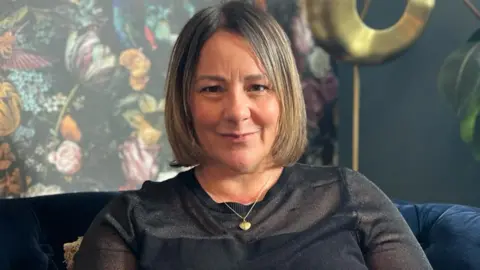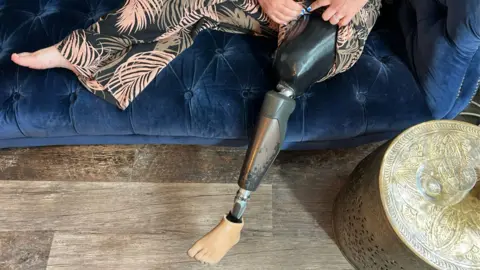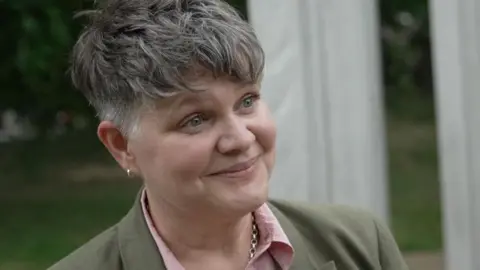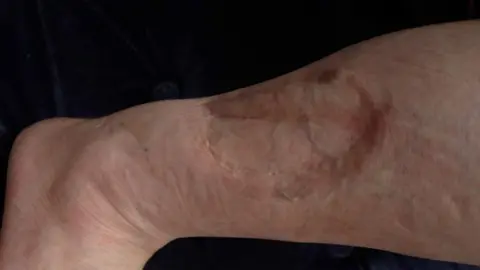'I want my London 7/7 bombing scars to help others'
 BBC
BBCWhen Sue Greenwood boarded a Piccadilly Line train to do her regular commute to work on 7 July 2005 her life changed forever.
Seven tube stops later, Germaine Lindsay boarded the same train, told her "you will have a good day" and detonated a bomb that killed 26 people.
Positioned just feet away from the suicide bomber, Mrs Greenwood survived the deadliest of the 7/7 terrorist bombings that in total killed 52 people and injured more than 770.
She lost her left leg and suffered many other injuries.
Twenty years later, Mrs Greenwood, 49, lives in Bournemouth with her husband, children and dogs, living a full and happy life.
She is an ambassador for the Scar Free Foundation, a medical research charity committed to achieving scarless healing, and shares her story to spread awareness about conflict-wound recovery.
On the day of the bombing, Mrs Greenwood was 29 years old and worked as an operating department practitioner at Great Ormond Street Hospital.
She recalls her commute to work starting an hour later than normal because she had a mandatory training course to complete.
Germaine Lindsay boarded the same train as her at Kings Cross Station with a rucksack full of explosives.
She remembers that he briefly greeted her, which she felt was "an odd thing to say in London".
The train left the station platform and moved into the tunnel where the bomb exploded.
"I always describe the explosion as a real force, like a real power, so you could feel that power and it was all dark - no noise at all," Mrs Greenwood explains.
"My first instinct was to get up and help people because that is what I do."

Despite wanting to support people in the carriage, she couldn't move: "I had some hand rails across my legs, and I was trying to get it off and it was at that point I saw my left leg and saw the damage that had been done.
"I'd seen amputations and traumatic injuries before, so I wasn't fearful and always knew I would walk again."
Using part of her cardigan, Mrs Greenwood made a tourniquet for her leg and waited for emergency services to arrive.
"For me I was lucky, I had no pain. No pain whatsoever. I was in fight-or-flight.
"The biggest shock was waking up [in hospital] and seeing all my other injuries that I didn't know I had.
"My right leg was also really badly damaged and I had lots of skin blown away at the Achilles tendon.
"I had deep cuts in my hands."

Charlotte Coates, the deputy chief executive of the Scar Free Foundation, says ambassadors like Ms Greenwood allow the charity to find out what priorities in recovery are important.
She said: "One of the areas of our work is conflict wounds and blast injuries.
"These are typically the type of injuries caused by bombs, caused by velocity, and they are particularly complex and difficult injuries to treat.
"This velocity, this blast, how does it impact wound healing and what can we do with that knowledge to develop better treatments?
"Those kind of treatments will be applicable to soldiers in wars but also sadly civilians involved in terrorist attacks like 7/7."

It wasn't until years after the attack that Mrs Greenwood says she properly came to term with her injuries: "I was focused on getting back functionally, and I achieved that really quickly.
"But 20 years later, when I reflect back, I was trying to hide my scars.
"I had foam around my metal leg to try and make it look normal. You probably wouldn't have known, unless I told you, that I was an amputee.
"When you have these scars the mental impact and the visualisation of the scars can be really, really traumatic.
"When you go to a swimming pool for example, people aren't just looking at your amputated leg, but they're looking at your other leg which has all these injuries."
During the recovery process, Mrs Greenwood's surgeon introduced her to the Scar Free Foundation, and coming from a medical background, she says she was fascinated by their research so became an ambassador.
When asked if she would take an opportunity to get rid of her scars, Mrs Greenwood answers: "In a heartbeat.
"The moment in time is history and my name is in the history books, but if I could have a functioning limb everyday then absolutely I would take it."
She says she feels "incredibly grateful" to have survived that day and is pleased to have used her experience to contribute to medical research.
But if faced with her 29-year-old self again, 49-year-old Mrs Greenwood has a lot of advice to give: "I wouldn't probably say 'don't get on the tube'.
"But I'd also say 'don't take life for granted'. Life is now. Learn from everybody. Be inspired. Always live life to the fullest because you don't know what's going to happen.
"A fellow survivor calls it 'life number one and life number two'.
"Life number two has been very different but just as fulfilling."
You can follow BBC Dorset on Facebook, X, or Instagram.
